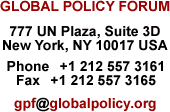By Craig N. Murphy *
Global Policy Forum*Opinion Forum
October 13, 2003
Observers of the United Nations can look on recent Iraq-related events only with sadness. In early October, more staff members left the UN's Baghdad office, already sharply reduced in response to the August attack that killed Sergio Vieira de Mello. Meanwhile, Martti Ahtisaari's high-level panel on staff security returned home without public comment, while the US floated a two-week ultimatum for a new Security Council resolution that would legitimate US and British action, bring other state's armies in to help prop up the occupation, and expand the UN's role in the country.
Does it really matter that the UN's presence in Iraq has shrunk to only a few dozen staffers who have little opportunity to carry out even the most basic functions? Those who have followed the UN's post-conflict work over the last 15 years, and who are aware of the UN's even longer presence in Iraq, know that it does matter, and it matters in many ways that may not be apparent to less-informed observers, even if they happen to be in the White House.
President Bush has suggested that the UN is good at writing constitutions, a back-handed compliment to officials involved in the more than 60 UN programs of technical assistance to democratizing countries since 1989. Unintentionally, Bush may have got something right: the UN secretariat and specialized agencies have a great deal of recent experience in fostering democratic transitions, a great deal more experience, for example, than has accumulated within the US government.
UNICEF has provided technical assistance to improve the quality of political reporting and promote a strong independent press in South Asia, Africa, and Eastern Europe. The UN has helped new political parties form and has trained once-warring military factions and exiled dissidents to become civilian competitors in Central America, Southern Africa, Cambodia, and East Timor. The UN has helped organize, conduct, monitor, and verify elections in dozens of countries. The UNDP has helped reformulate municipal law to make dozens of governments more accountable and transparent. The ILO has worked with unions, employers, and governments to establish viable democratic labor codes. Resident representatives in aid-receiving countries have helped marshal the talent of all the specialized agencies to support the growth of civic organizations that are a vital part of any new democracy.
The UN has some further, less visible, strengths relevant to post-war Iraq. The staff of the secretariat and the specialized agencies includes many with long experience in the country, and many more who are Arab or Muslim. In the 1980s, between the Israeli bombing and the Iran-Iraq War, Baghdad even served as the headquarters of the Economic Commission for Western Asia. Its offices housed accomplished international civil servants who broke the stereotypes now accepted in Washington, women like Fatima Almana, the Saudi geologist in charge of the UN's program promoting industrialization and diversification throughout the Arab world in the 1980s. The UN can marshal a staff with skills appropriate to helping Iraqis make their society prosperous and democratic who also have the experience and cultural credibility needed for success.
Finally, of course, the UN has been far more effective than the US, over a wider range of cases, in marshaling and coordinating post-conflict financial assistance from other governments. The Americans are discovering to their dismay that pledging governments too often say that "the check is in the mail." The more reliable of donors, those that really do send the checks (the EU, Germany, the Netherlands, Scandinavia, Japan), are far more likely to respond to requests for Iraq from Kofi Annan than from George Bush.
In contrast to donor countries, the private sources recruited by the Americans for rebuilding Iraq have paid in advance! The Bush administration has relied heavily on contractors with close connections to the Republican Party. They probably look like the most trustworthy people known to the Administration who have some experience running oil fields, building telephone systems, and restarting power plants. But the UN and the groups with which it has worked since the end of the Cold War have much more extensive and relevant experience rebuilding public service networks over countries as vast as Iraq, finding appropriate contractors to create new infrastructure, and guarding and protecting vital utilities in places where armed forces, bent on thwarting the post-conflict order, remain.
It is hard to say which tragedy is worse, the loss suffered by the families, friends, and colleagues of Vieira de Mello and the other UN officers who died trying to help the people of Iraq, or the loss suffered by the people of Iraq because UN officials cannot do the jobs they know how to do.
* Craig N. Murphy is the M. Margaret Ball Professor of International Relations at Wellesley College and Chair of the Academic Council on the United Nations System (ACUNS).
More Information on the UN Role in Post-War Iraq
More Information on Iraq


